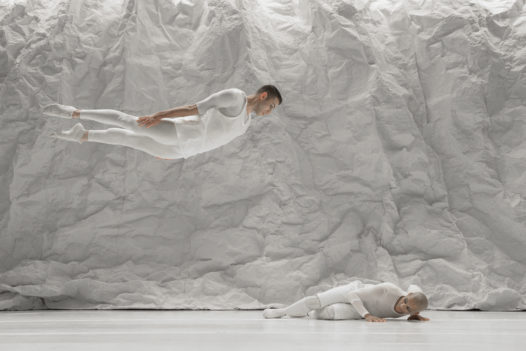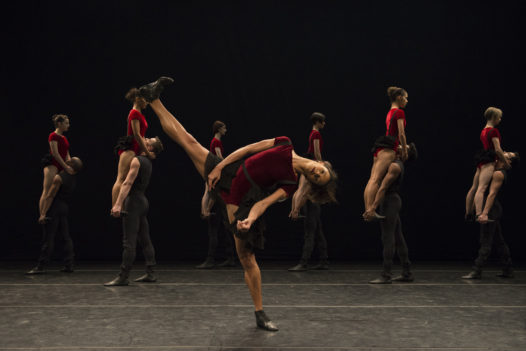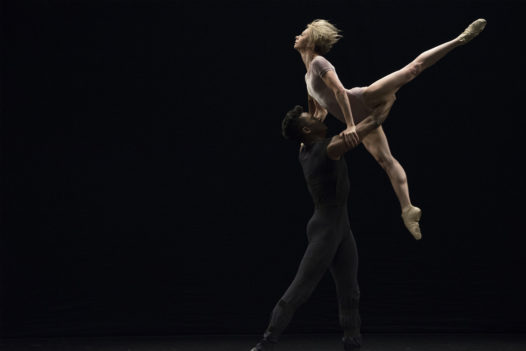
Grupo Corpo’s Suite Branca (Photo: Jose Luiz Pederneiras)
When the New Orleans Ballet Association says they are “kicking off” their season, they do not just mean metaphorically. With their main stage season opening on Saturday, October 15 at the Mahalia Jackson Theater, they have chosen to spotlight Grupo Corpo for their opening night. Beyond being hailed as “some of the best dancers on the planet” by The Globe and Mail, Grupo Corpo also embraces what we here in New Orleans love and cherish. Family.
Grupo Corpo, which was established in 1975, is founded by two brothers – artistic director and designer Paulo Pederneiras and choreographer Rodrigo Pederneiras. These Brazilian-based brothers have intertwined their artistic endeavors for decades and will be celebrating the company’s 40th anniversary. Family, celebration, and a fusion of classic ballet, modern, and Brazilian folk dances like samba and capoeira, this has New Orleans written all over it.
The company and the performances plunge much deeper than graceful, herculean body movements and artistic sets, though. Talking with choreographer Rodrigo Pederneiras proved that the thoughts and interpretations that come before the dances hit the main stage imperatively enhance the experience for the dancers and the audience. Over a crackling phone line and many spouts of laughter about our language barriers, Rodrigo and I talked about everything from negative space to eliciting feelings that go beyond a usual sensation.
Q: How do you think about negative space?
RP: My job is to fill up the space. I work with space all the time. Empty space for me is not dance, it is not art; it is just a space. Sometimes, though, I look at the space as part of the creation. It is like the silence before someone talks. Sometimes you need the empty space in order to give more power to the movement you introduce in that space.

Grupo Corpo’s Danca Sinfonica (Photo by: Jose Luiz Pederneiras)
Q: When do you know that something is yours?
RP: For me, I think when I really love the thing that it becomes mine. If I love it, it comes inside of me and becomes part of me. Most of the time we work with sensations because working with emotions is much more difficult. When I choreograph, I can look at the viewers or the dancers, and I can see that they are feeling new sensations, and that also goes inside of me. In a way, the viewer or the dancer gives that to me. We share that emotion. When you are able to create emotions, and this is definitely not all the time, that is the maximum.
Q: When have you experienced a time when a movement was beautiful but it did not work with your choreography?
RP: It happens a lot. I have ideas in my head that I am sure will happen. Then, I try to create it. I try to give a shape to the idea, and it simply does not work. I realize quickly that it is not good, and I have to change all of it.
I have no problem changing things. I know that I am wrong many times, so I change the choreography many times in each ballet or piece.

Grupo Corpo’s Danca Sinfonica (Photo by: Jose Luiz Pederneiras)
Also, there is the issue of time. I have to finish the piece. If I keep changing things, it will kill the time. At some point I have to say, ‘Now this is okay,’ and that is a feeling you get. It’s like when you see a picture and you say, ‘I like this or don’t like this.’ It’s a feeling.
Q: What human habit most inspires your work?
RP: I love to watch people walk. I do this sometimes in the square where I live in Brazil. When I start looking for Brazilian movement and looking for Brazilian ways to move, I sit and watch people walk. I watch them move in the streets. The small things that change from one person to another is just fantastic.
I can also be inspired by the music. This is also funny because I have to listen to the music many times before I start to work with the piece. I hear it many many many times. [Laughing]. When I finish a piece, I do not listen to the music for years. [Laughing].
Feelings, sensations, and possibly even a movement toward new emotions will all be taking place on Saturday, October 15, when Grupo Corpo takes the stage at Mahalia Jackson Theater (1419 Basin Street). Single tickets for Grupo Corpo begin at $24 and can be purchased through the New Orleans Ballet Association Box Office at (504) 522-0996 or www.NOBAdance.com, and through Ticketmaster at (800) 745-3000 or ticketmaster.com. Subscriptions for NOBA’s 2016-17 Season and discounted tickets for groups of 10 or more, students and seniors are also available.
 NOLAbeings Multimedia artist Claire Bangser created NOLAbeings as a portrait-based story project that marries...
NOLAbeings Multimedia artist Claire Bangser created NOLAbeings as a portrait-based story project that marries...  Voodoo in New Orleans: Reviving history: New Orleans fortune telling This article takes a deep dive into the history of Voodoo in New Orleans, its hybridization with Catholicism, and its present-day place in the city's culture. The author visits fortune-tellers in the French Quarter, using their guidance as a tool for introspection rather than a deterministic predictor of the future. Through her experiences in New Orleans, the author feels a mystical connection to both the past and the future.
Voodoo in New Orleans: Reviving history: New Orleans fortune telling This article takes a deep dive into the history of Voodoo in New Orleans, its hybridization with Catholicism, and its present-day place in the city's culture. The author visits fortune-tellers in the French Quarter, using their guidance as a tool for introspection rather than a deterministic predictor of the future. Through her experiences in New Orleans, the author feels a mystical connection to both the past and the future. 